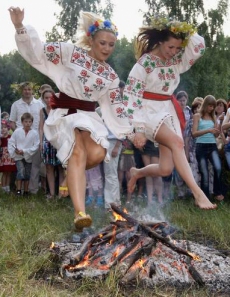First some music…
As explained here and here, our forebears believed in reincarnation and the eternal existence of the honourable man. There was no “punishment” for the bad, and no “reward” for the good, other than rebirth – here on Earth, in the kin – for the honourable.
What they believed was that when you died your body went to Hel (“hidden”), i. e. the burial mound/grave. This was a cold, dark and damp place, but it was really just a name for the grave. Our dead bodies return to earth, as simple as that. Your mind (called “soul” by the Judeo-Christians) was sent to heaven to be purified by the fire of the Sun. Again, like with Hel, there was no ‘punishment’ or ‘suffering’ involved. You just had to remove the bad parts with cleansing fire, to make sure they did not return when you were reborn into a new body.
The amount of ‘you’ to be reborn was equal to the ‘amount of your mind’ that would be left after the cleansing fire had removed the bad parts. Thus the truly honourable could be reborn ‘in full’, so to speak. Others had only small fragments of their minds reborn, and of course yet others – the thoroughly rotten – were simply removed. They ceased to be, they ceased to exist. They passed into oblivion.
The most honourable dead were buried in beautiful graves, and when the children grew old enough they could chose themselves whom they were to be reborn as. The more honour a dead person had, the more children would be interested in being reborn as him.
Men often chose to bring their most valuable possessions with them into the graves when they died, to make sure that they could keep them in the next life as well – and possibly also to entice children to chose to be reborn as them, if their honour was not enough. So the more honour and the more wealth a dead person had, the greater the probability that a child would choose to be reborn as him.
If a dead person was never chosen by a child, then he would never be reborn. So the honour itself was not enough: the honourable dead had to be chosen by a child as well, in order to be reborn. There was no automatic rebirth even for the most honourable.
European Pagans also let the fire purify in life:
You might argue that there is no evidence to support the belief in reincarnation. You might claim that there is no such thing. Ok, but as I see it we will be better off if we live in societies where people believe in reincarnation than we are in societies where people believe in either nothing (atheists) or in some fictional “Heavenly Paradise” (Judeo-Christianity). It doesn’t matter if it is real or not: what matters is that people who believe that they are to be reborn here on Earth, in the same society, will do their best to ensure the happiness and health of their descendants!
Will you catch all the fish in the ocean, kill all game in the forest, chop down all the trees or pump up all the oil and use it all in your lifetime, if you believe that you will be reborn here on Earth? Will you leave nothing for your future reborn self? Of course not. You will instead try to preserve all that is good, to create more good, and try to pass it on to those who come after you – to yourself in future lives.
I care not if I actually am to be reborn or not, if reincarnation is real or not, but I see the value of such a belief system for my species, and understand that only such a belief system will ensure the survival of all that is good and just. Only such a belief system will enable the betterment of our species. No matter what you think, say or feel; all the alternatives are worse in all respects, because whether we like it or not: man is an egotistical creature. Rather than try to suppress man’s ego, we should use it to cultivate great societies.
HailaR WôðanaR!
The purifying fire of the Sun:


